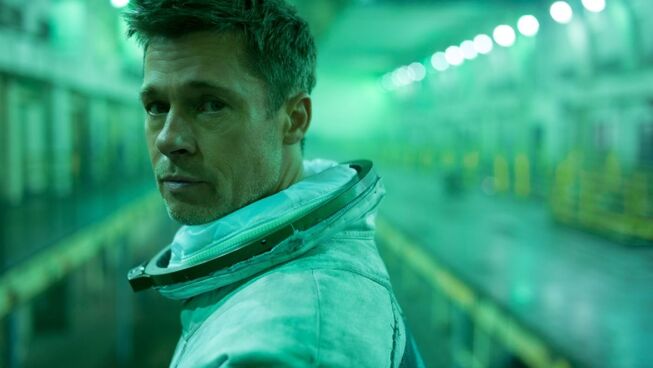
Author: Robert K Johnston - Reel Spirituality
The claim of a growing number of books in theology and film, including my own, is that viewers can have deep spiritual experiences while watching movies. In my Reel Spirituality (2nd edition, 2006) and in Finding God in the Movies (2004), which I co-wrote with Catherine Barsotti, I suggest that God shows up at the movies. Such an assertion is echoed by Andrew Greeley and Albert Bergesen in their book God in the Movies (2000), in David Dark’s Everyday Apocalypse: The Sacred Revealed in Radiohead, The Simpsons, and other Pop Culture Icons (2002), and in Craig Detweiler’s Into the Dark: Seeing the Sacred in the Top Films of the 21st Century (2008), to name only three. But what does the claim of God’s “presence” in film actually mean? Is it a form of general revelation, or common grace, or natural theology, or natural revelation?
It is recorded that after listening to a concert by the famous violinist Yehudi Menuhin, Albert Einstein went backstage and said to the artist, “Thank you, Mr. Menuhin; you have again proved to me that there is a God in heaven.” What did Einstein mean? Were his words a figure of speech, a compliment akin to saying the music sounded “heavenly”? Or did this famous scientist believe that art had mediated for him an experience of Transcendence? Neil Postman would think such mediation unlikely, particularly when it comes to watching movies, one of the popular arts. Much more probable, he thinks, that in our experiences with the popular arts, we are simply Amusing Ourselves to Death (1985).
In an effort to get a handle inductively on the question of how movie-going might be a spiritual experience for the viewer, I have asked students in my last three theology and film classes to write a short paper describing their most personally compelling spiritual experience while watching a movie. Have they ever experienced the T(t)ranscendent through film in such a way that they were provided a lens through which to view the world? Have they ever watched an entertaining movie that had been more than that for them? I asked them to narrate their most notable experience. My question was purposely open-ended and ambiguous, as I was interested in uncovering what “spiritually significant” actually meant in the lives of these film-watchers.
Although the reported experiences varied widely and the movies chosen proved radically diverse, there were nonetheless three general responses from the approximately 150 students who wrote testimonials. Approximately one-third described how a particular movie had mediated God’s presence to them. They described a divine encounter which had proven transformative in their lives. A second group of approximately the same size had not been sure that their “transcendent” experience was of the divine, but they were clear that their movie-going experience had affected their spirits deeply, their lives being significantly altered by what they had seen. They had encountered what the poet T. S. Eliot once described as “a still point in a turning world.” The final third asserted that though they had no such spiritual/Spiritual experiences in or through film, their watching of a particular movie had provided a deepened spiritual insight and understanding of theological truth revealed to them through Scripture and the Christian community. That is, certain movies—often with quasi-religious themes—served as religious parables for them, helping them better understand the importance of God’s truth in their lives. Examples of each kind of experience can be instructive:
Eliot on Transcendent Poetry
“It’s strange that words are so inadequate,” T. S. Eliot said, “Yet, like the asthmatic struggling for breath, so the lover must struggle for words.” The American-born poet had a double portion of suffering that infused itself into poetry, plays, and literary criticism that shaped a generation. Eliot’s reputation grew to nearly mythic proportions in the decades that he was a dominant figure in the English-speaking world, with “The Waste Land” considered by many to be the most influential poetic work of the twentieth century, alongside “The Four Quartets,” “The Hollow Men,” and the play Murder in the Cathedral. He believed poetry was a form of groaning too deep for words, saying, “genuine poetry can communicate before it is understood.” He was awarded the Nobel Prize in 1948, of which he famously quipped, “The Nobel is a ticket to one’s own funeral. No one has ever done anything after he got it.”
1. Encountering God
 Some students recounted how within the film-viewing experience, they had met God. A student in his early sixties, to give but one example, is presently a pastor of an alternative style communal church in Southern California. He has greying hair pulled back in a ponytail. He wrote of being transfixed by the movie Easy Rider, when it came out in 1969. Staying to see the movie through three consecutive screenings, he told how he was moved by the experience of Wyatt and Billy as they visited a hippy commune in New Mexico during their road trip to Mardi Gras. The goodness of those city folk who were ill-prepared to farm, but who desired “simple food for our simple lives” so that they could increase their generosity towards others, was illuminating for him. When the two buddies got on their motorcycles to leave the commune, the student said that he spoke out into the darkened theatre, saying to the two travellers, “You’re blowing it.” He sensed even before Billy (Peter Fonda) suggested that they might be making a mistake to leave these good folk, that here was spiritual truth he had yet to experience, but which he wanted badly. After sitting through the third showing, this student got on a bus and went into Washington, D.C., in search of a Jesus People commune he might join. Though he was not yet a “Christian,” he wanted to be, for he had encountered God in the theatre and wanted now to know God personally. Now, forty years later, this student continues as a “hippy” pastor, living in community and seeking to share in word and deed the Good News of Jesus with others.
Some students recounted how within the film-viewing experience, they had met God. A student in his early sixties, to give but one example, is presently a pastor of an alternative style communal church in Southern California. He has greying hair pulled back in a ponytail. He wrote of being transfixed by the movie Easy Rider, when it came out in 1969. Staying to see the movie through three consecutive screenings, he told how he was moved by the experience of Wyatt and Billy as they visited a hippy commune in New Mexico during their road trip to Mardi Gras. The goodness of those city folk who were ill-prepared to farm, but who desired “simple food for our simple lives” so that they could increase their generosity towards others, was illuminating for him. When the two buddies got on their motorcycles to leave the commune, the student said that he spoke out into the darkened theatre, saying to the two travellers, “You’re blowing it.” He sensed even before Billy (Peter Fonda) suggested that they might be making a mistake to leave these good folk, that here was spiritual truth he had yet to experience, but which he wanted badly. After sitting through the third showing, this student got on a bus and went into Washington, D.C., in search of a Jesus People commune he might join. Though he was not yet a “Christian,” he wanted to be, for he had encountered God in the theatre and wanted now to know God personally. Now, forty years later, this student continues as a “hippy” pastor, living in community and seeking to share in word and deed the Good News of Jesus with others.
For two other students, it was watching 12 Monkeys or I Heart Huckabees that became the occasion for experiencing God. For these women, these movies became the occasion for God to both expose the shallowness of their present lives and to awaken their spirits to something other and more. Other students recounted transformative experiences seeing Departures, Up, The Last Temptation of Christ, The Iron Giant, Magnolia, Slumdog Millionaire, There Will Be Blood, Big Fish, Legends of the Fall, The Ultimate Gift, Shawshank Redemption, and Braveheart. Though these movies vary greatly, the experience was similar—while viewing these films in the dark, these students said they had truly met God.
2. Gaining “Spiritual” Insight
 A second group reflected that during their movie-watching experience, they had not necessarily encountered “God” (they couldn’t be sure), but they did know that their lives had been illumined—even transformed—in significant ways. Through their movie-viewing, there had been an enlargement of their being. For many there were tears of identification as the story on the screen connected in significant ways with their own stories. While watching Finding Nemo, for example, one student recounted how Nemo’s reconciliation with his dad puts him “in ruins.” Similarly, in Toy Story 3, as the toys slide down the giant pile of trash into the furnace to meet their “death” while holding hands in solidarity, he wept. These toys had been his friends for ten years, both in the movie theatre and as he played with them with his daughter. Now, as they prepared to meet their demise, he recognised “there was something going on between them.” They were connected. They touched each other; they consoled each other. Though they were plastic, they were able, he said, to make him choke on his heart. Somehow they were more real than real life. He wrote, “I’ve never been a toy cowboy, but for some reason I’m capable of understanding how Woody feels to know he belongs to Andy.”
A second group reflected that during their movie-watching experience, they had not necessarily encountered “God” (they couldn’t be sure), but they did know that their lives had been illumined—even transformed—in significant ways. Through their movie-viewing, there had been an enlargement of their being. For many there were tears of identification as the story on the screen connected in significant ways with their own stories. While watching Finding Nemo, for example, one student recounted how Nemo’s reconciliation with his dad puts him “in ruins.” Similarly, in Toy Story 3, as the toys slide down the giant pile of trash into the furnace to meet their “death” while holding hands in solidarity, he wept. These toys had been his friends for ten years, both in the movie theatre and as he played with them with his daughter. Now, as they prepared to meet their demise, he recognised “there was something going on between them.” They were connected. They touched each other; they consoled each other. Though they were plastic, they were able, he said, to make him choke on his heart. Somehow they were more real than real life. He wrote, “I’ve never been a toy cowboy, but for some reason I’m capable of understanding how Woody feels to know he belongs to Andy.”
Another respondent told of watching Lars and the Real Girl and feeling compelled to go online and seek admission to Fuller’s School of Psychology. Nominated for an Oscar in 2007, this film tells the story of Lars Lindstrom, a reclusive, socially awkward young man in a small Minnesota, “Lutheran” town where everyone knows everybody else. Lars refuses to be with others until one day he shows up for dinner at his brother and sister-in-law’s house with Bianca, a blow-up doll who he explains is a former missionary to Brazil. As the story unfolds, the town, and more particularly the church must decide how they will deal with the “new” Lars, and especially Bianca. Ultimately, the church responds as “the church,” loving Lars into a newfound wholeness. My student wrote that after seeing the movie she felt the need to enrol in a “psych” program to help those like Lars and her brother! The movie’s story had become her own.
Still others recounted how watching Garden State, Flashdance, Sweet November, Wings of Desire, Castaway, The Lion King, or Star Wars transformed their lives in significant ways. Particularly dramatic was one woman who told of being raped, robbed, kidnapped, and shot one Christmas season. Several years later, plagued by thoughts of suicide, she saw It’s a Wonderful Life and found within that experience a “small hope” that allowed her to go on. She wrote, “I don’t know if this was a divine encounter or (simply) spiritually enhancing; but what it was is life transforming.”
3. Better Understanding Christian Truth
For a third group, they believed that what one can learn from general revelation was dependent on what first had been revealed to them through special revelation. Given our sin, we are incapable of knowing God apart from Christ. But for Christians, movies can deepen, even radicalise, our understanding of the faith. For one such student, it was Signs that helped that student recognise God’s providential care. The movie tells the story of an Episcopal priest who loses his faith after his wife is tragically killed while jogging at dusk on the side of a country road. Subsequent events compel him to believe that life is not random—it can’t be. For this viewer, the journey of Mel Gibson’s character away from faith and then back to faith helped him understand that even when God seems to be “no where,” God is “now here.”
Another student told of seeing The Elephant Man, David Lynch’s 1980 masterpiece that garnered eight Oscar nominations. The film is based on the true-life story of John Merrick, a nineteenth-century Englishman who is consigned as a “freak” to the circus because of a hideously deformed body due to a medical anomaly. Helped by Frederick Treves, a medical doctor who first views John as a specimen to be used for a research project but who later comes to care about him, John is able to begin haltingly to speak and eventually to be recognised for his gentle humanity by those throughout London society. For the student who wrote on this movie, John Merrick showed him “a full humanity: in suffering, in faith, hope, and love.”
The list of movies that became parables of Christian truth for these students was varied and long, just as with the others: The Natural, Shawshank Redemption, The Color Purple, The Tree of Life, Mother Teresa, The Dark Knight, Wall-E, Into the Wild, American Gangster, and Remember the Titans, among others. Many of the movies had explicit religious themes, imagery, or scenes, and others did not, yet all functioned as visual reminders of Christian theology—metaphors of Christian truth that proved compelling.
Conclusion
Can reel spirituality become a real spirituality? Clearly it can. But what that means varies, depending both on the movie experienced and on the theological understanding that one brings to the viewing. It also depends on the mysterious presence of the Spirit who, like the wind, “blows wherever it pleases” (John 3:8). For some, their theological knowledge was deepened. God’s truth was radicalised through a movie functioning as parable; they saw truth more fully. For others, their spirits were quickened/challenged/encouraged as they experienced the lives of others on the screen. And for still others, film became the theatre where God’s presence became manifest. They did not just know more about God; they knew God afresh or for the first time.
Interestingly, here are three classical understandings of what Christians have called “natural theology.” As Richard Viladesau writes in his Theological Aesthetics (Oxford University Press, 1999) “Aesthetic experience seems to play a major role—at least for some people—in the exercise of the practical judgment for belief in God—perhaps a great deal more than the traditional ‘proofs’ of God’s existence set forth in apologetic theology.” Certainly this proved true for students in the theology and film classes I teach. For them, in a darkened room, a “reel spirituality” happened.
Experiencing the Spirit at the Movies
 A partial list from Rob Johnston and Cathy Barsotti:
A partial list from Rob Johnston and Cathy Barsotti:
- The Elephant Man, David Lynch (1980)
- Chariots of Fire, Hugh Hudson (1981)
- The Year of Living Dangerously, Peter Weir (1982)
- Tender Mercies, Bruce Beresford (1983)
- Places in the Heart, Robert Benton (1984)
- Babette’s Feast, Gabriel Axel (1987)
- The Decalogue, Krzysztof Kieslowski, (1989–1990)
- Household Saints, Nancy Savoca (1993)
- The Apostle, Robert Duvall (1997)
- Life Is Beautiful, Roberto Benigni (1997)
- American Beauty, Sam Mendes (1999)
- The Iron Giant, Brad Bird (1999)
- Millions, Danny Boyle (2004)
- Hustle and Flow, Terrence Howard (2005)
- Into Great Silence, Philip Gröning (2005)
- Leonard Cohen: I’m Your Man, Lian Lunson (2005)
- March of the Penguins, Luc Jacquet (2005)
- Babel, Alejandro Gonzalez Inarritu (2006)
- Lars and the Real Girl, Craig Gillespie (2007)
- Departures, Yôjirô Takita (2006)
- Up, Pete Docter, Bob Peterson (2009)
- Of Gods and Men, Xavier Beauvois (2011)
- Poetry, Chang-dong Lee (2011)
- The Tree of Life, Terrence Malick (2011)






